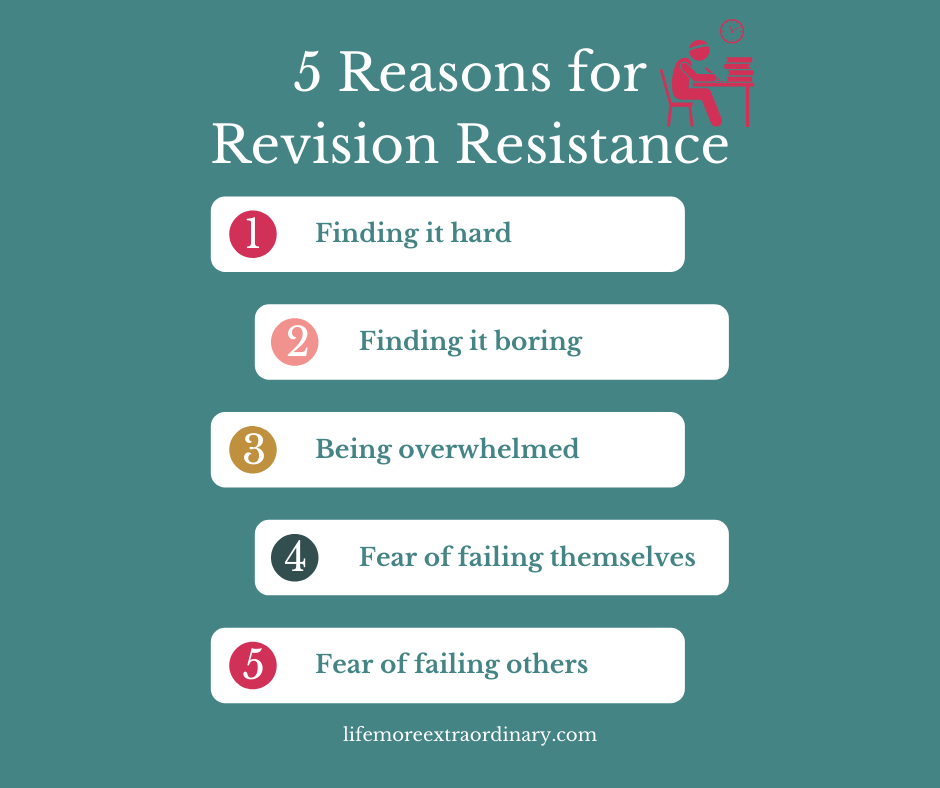Lack of motivation might not be the REAL problem behind your child’s revision struggles
Podcast: Play in new window | Download
Subscribe: RSS
Does your child say that they're just not motivated to get on with their revision or do their homework?
This is one of the most common problems that I hear from students. They say:
“I can't get motivated to study!”
Or,
“I've got no motivation for my revision.”
But, when I probe a little more deeply I find that lack of motivation isn't the real problem.
Does your child want to do well?
This is the key question to ask to understand whether your child is motivated or not.
If they want to do well, they do have motivation. In my experience, most young people have some desire to do well in their GCSEs or A-Levels. Afterall, no-one really enjoys failure.
If they do want to do well, then you have to look a bit further to find the real reason why they're not getting down to do the work.
Are they really procrastinating?
Many students confuse lack of motivation with procrastination.
Verywellmind.com defines procrastination as:
“…the act of delaying or putting off tasks until the last minute, or past their deadline. Some researchers define procrastination as a “form of self-regulation failure characterized by the irrational delay of tasks despite potentially negative consequences.”
What this basically means is that someone is trying to protect themselves from failure by delaying a task.
Often, young people will find it difficult to explain what type of failure they're trying to avoid. But, in my experience, there are two types of failure in the studying process.
1. Ultimate failure in their exams
This means they don't get the grades they feel they deserve based on their intelligence or the work they've put in. They may be scared of the disappointment this might cause in themselves, the disappointment their parents or teachers might feel or how others, such as their friends, perceive them.
Avoiding revision isn't really a rational way to deal with these fears – but when our brains feal fear they go into the primitive stress response. And, for some people this means they ‘freeze', or they run away (flight) which is what's happening when people don't do the work because of fear of failure.
2. Failure in the process
This means that as they go through the motions of revision, they don't see themselves succeeding task by task. For example, they might find that they don't remember something as well as they think they ought to after looking through their notes. Or, that they don't get as good a mark as they hoped after revising for a test. Or, they might just find the revision process boring or difficult. They avoid these uncomfortably feelings by procrastinating about their revision or homework, distracting themselves with more comfortable tasks.
5 reasons for revision resistance
1. Finding it hard
Many students find revision hard because they're not using active revision techniques that help them understand and remember what they're learning.
2. Finding it boring
Too many students engage with their revision passively, which makes it boring and ineffective.
3. Being overwhelmed
If students don't know where to begin, revision can feel like too big a task to tackle.
4. Fear of failing themselves
It's a natural stress response to freeze, or run away from, tasks that you're not confident you'll succeed in.
5. Fear of failing others
The shame of letting parents and teachers down is a real underlying fear for some students.
How to overcome the reasons for revision resistance
When I teach students how to revise in The Extraordinaries Club and on my Revision Kickstarter Workshops many students go from seeing revision as ‘boring', ‘difficult', ‘overwhelming' and ‘scary' to actually feeling that it's doable, interesting and motivating.
The key thing that is really preventing many students, who do ultimately want to do well, from revising is that they don't actually know how.
It's actually a logical response to stop doing something when you can see it's not working. When students don't know how to revise, they often use the wrong revision techniques that don't help them make progress. But, when they understand the nature of revision and how to do it to be successful they are generally much more enthusiastic, are much more consistent with their revision and get better marks.
One parent member of The Extraordinaries Club recently posted this in our members' only Facebook group:
“[My daughter, year 11] had another round of (9!) mock exams this week. Clearly a better experience than last time from the focus on active revision, more conscious self-care (sleep, breakfast, less phone time) to actually sitting the exams with a calm mindset. Thank you for this club!”
The real way to overcome revision resistance is to make sure your child knows how to revise. In most cases, they will want to do well, it's just a matter of giving them the skills that will enable them to stick with their revision and reap the rewards.
Would you like help teaching your child how to revise?
 Download this free chapter of my book, The Ten Step Guide to Acing Your Every Exam You Ever Take. In the chapter you'll:
Download this free chapter of my book, The Ten Step Guide to Acing Your Every Exam You Ever Take. In the chapter you'll:

